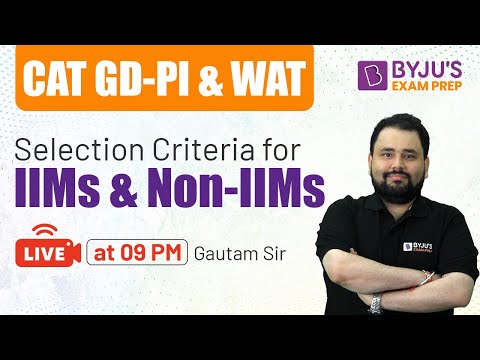Acing CAT alone will not be able to realize your B-School dream. Personal Interview, Group
Discussion & WAT constitutes the next stage of getting into an IIM. It is crucial for candidates to ace the second stage in order to secure their seat at one of prestigious colleges in India.
Watch BYJU’S expert IIM-C Alum on an interactive session on GD-PI prep:

Personal Interview is the final and the most important step to help you get into the top IIMs and B-school colleges. Personal Interview round should be far-reaching yet casual. Candidates should try to be witty, funny and confident. Candidates can check the IIM interview tips to be able to prepare themselves for the interview. Though there are several interview questions that the interview panelists ask, the candidates should be aware of questions that are frequently asked in a personal interview to excel in this final frontier.
Here the top 10 most expected questions that the candidates have to answer in a round of PI:
Top MBA Interview Questions:
- Tell us something about yourself:
- Your educational and professional background
- Your family
- Your interest and passion
- Why did you choose MBA as your career
- Where do you see yourself in 5 years?
- Why should I select you?
- Do you have any regrets?
- Questions about your past
- Your strength/weakness
- Why do you want to join this school?
- Questions from GD
- Do you have any questions for us?
This is the most common and one of the first questions asked in any interview. Remember to be brief. Don’t bore them with your long stories. Make sure you mention these aspects of your life in a creative way:
Remember to link your interest in management studies while mentioning the third aspect.
Your answer should depend on whether you’re a working professional or a recent graduate. Never make it look like you took it out of curiosity or boredom. Make sure to involve the right aspects of management in the modern world and how it will be a valuable addition to your career goals.
Make a note that this question is asked because the interviewer wants to know whether MBA is a good fit for you or not. Try not to lie. An answer like “career advancement” or “career kickstart” is a very outdated and monotonous answer. Talk about your weaknesses and how MBA will equip you with the desired skill set for the future.
Your primary focus while answering this question should be that you are fit for the student profile they are looking for. Make them understand that you’re hardworking, loyal and have the ability to handle stressful situations.
Answer it honestly. Even if your answer is no, try to make the outcome of the situation very positive. If your reply is yes, don’t be overconfident about it. They want to know if you learned anything from your past and whether it reflects on your potential shortcomings in your life.
The interviewer wants to know what all you did in your college life and your working profession. Make sure you did something productive and related to management and business. And if you didn’t, tell them how you never got an opportunity and how much you’re looking forward to doing that in their college. If you’re a working professional, you should be prepared to know each and every detail of your previous company i.e. your job profile, your organization and its value in the market.
Have you ever analyzed yourself? If not, now is the time to do a SWOT analysis i.e. Strength, Weakness, Opportunity, and Threats. Make sure that your strength and weakness doesn’t contradict each other. For e.g. if your strength is reading body language, your weakness shouldn’t be being gullible. Avoid the cliched tactics of presenting your strength as your weakness.
Know about the institution’s history; know about their placement records, its ranking and then how it has fascinated and inspired you and how your admission to that college will make one of your dreams come true. Research about their institute and ask their students who will be able to give you valuable insights into the college’s academic record and its extra-curricular activities and its flagships.
They will be curious if you got lucky in your group discussion or are very intelligent. There are chances that the topics discussed in your GD could be asked again in your PI. So don’t change your point of view while answering this particular question.
Never say ‘no.’ This would make you look like you didn’t learn anything from this interview and you are not willing to ask them about their institution’s history or anything about the academic profile. Don’t ask them about its placement records and salary related inquiries. Your curiosity shouldn’t be reflected as part of your greed.
Once your interview is finished, have a smile on your face and greet them goodbye with a thank you note. Don’t ask any unnecessary questions. Remember that these are the top 10 questions asked in a CAT personal interview. Your discussion can go on from 5 mins- 50 mins. It all depends on you whether you were able to stand out from other candidates or whether you’re one of the mainstream crowds.
For more tips and tricks like this on personal interview and CAT exam preparation stay tuned to us, at BYJU’S we also provide study material, CAT syllabus and interactive videos for an in-depth understanding of each subject and topic.